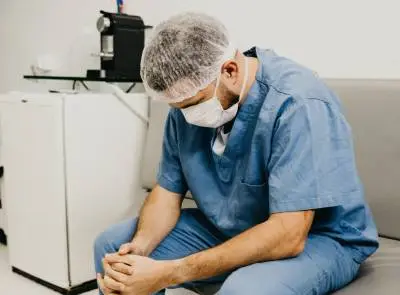If you’ve been the victim of medical malpractice in Washington D.C., it’s essential to take the necessary steps to protect your rights and seek justice. In this guide, we’ll outline a comprehensive plan, including steps to gather evidence, report the incident, and hire an attorney.
- Understand medical malpractice
What is medical malpractice?
Medical malpractice is a legal term that refers to a situation where a healthcare professional, such as a doctor, nurse, or therapist, breaches their duty of care towards a patient, resulting in harm or injury. This breach occurs when the healthcare provider’s actions or omissions deviate from the accepted standard of care within the medical community.
In a medical malpractice case, the patient, or plaintiff, must prove that the healthcare provider was negligent in their treatment or care, and this negligence directly caused the patient’s injuries or harm. Examples of medical malpractice can include misdiagnosis, failure to diagnose, surgical errors, medication errors, and negligence in administering treatment or monitoring the patient’s condition.
It’s important to note that not all adverse outcomes in medical treatment are considered malpractice. Medicine is complex, and sometimes, despite the best efforts of healthcare providers, patients may experience complications or negative results. Medical malpractice occurs when the healthcare professional’s actions fall below the accepted standard of care, leading to harm or injury.
What are some examples of medical malpractice?
Medical malpractice can take many forms, with some examples including:
- Misdiagnosis: A healthcare professional may diagnose a patient with the wrong condition, leading to incorrect or delayed treatment, which can cause further harm or complications.
- Failure to diagnose: A provider may fail to identify a medical condition, which can prevent the patient from receiving timely and appropriate treatment, potentially leading to worsening symptoms or irreversible damage.
- Surgical errors: Mistakes made during surgery, such as operating on the wrong body part, leaving surgical instruments inside a patient, or causing damage to surrounding tissues, organs, or nerves, can have severe consequences.
- Medication errors: Administering the incorrect medication, incorrect dosage, or failing to consider drug interactions can cause harm to a patient, and in some cases, may even be life-threatening.
- Anesthesia errors: Errors in administering anesthesia can lead to serious complications, including brain damage, organ failure, or death. These errors may include giving the wrong dosage, failing to monitor the patient properly, or not considering the patient’s medical history.
- Childbirth injuries: Negligence during pregnancy, labor, or delivery can result in harm to the mother or the baby. Examples include failing to diagnose a medical condition in the mother, not recognizing signs of fetal distress, or improper use of forceps or vacuum extraction.
- Inadequate follow-up care: Healthcare providers have a duty to monitor their patients’ progress and address any complications that arise. Failure to provide appropriate follow-up care or to respond to changes in a patient’s condition can result in further harm.
- Informed consent violations: Patients have a right to be informed about the risks, benefits, and alternatives of a proposed treatment or procedure. If a healthcare provider does not obtain informed consent and the patient suffers harm as a result, this may be considered malpractice.
- Hospital errors: Errors made by hospital staff, such as administering the wrong treatment or failing to properly monitor a patient, can lead to harm. Additionally, hospitals can be held liable for inadequate policies, procedures, or staffing.
- Healthcare-acquired infections: If a patient acquires an infection due to a healthcare provider’s negligence in maintaining a sterile environment, adhering to proper hygiene practices, or following infection control protocols, this could be considered malpractice.
It is important to note that not every adverse outcome or medical complication is a result of malpractice. Medicine is complex, and negative outcomes can occur despite healthcare providers adhering to the accepted standard of care. For a situation to be considered medical malpractice, there must be evidence that the healthcare provider’s actions or omissions fell below the accepted standard of care, directly leading to the patient’s harm or injury.
How can you prove medical malpractice?
Proving medical malpractice involves demonstrating that a healthcare professional’s actions deviated from the accepted standard of care and that this deviation directly caused the patient’s injuries or harm. Establishing these elements typically requires a combination of expert testimony, medical records, and other supporting evidence. Here are some key steps to prove medical malpractice:
- Establish the standard of care: The standard of care refers to the level of care that a competent healthcare professional with a similar background and in a similar situation would provide. Expert witnesses, usually medical professionals with experience in the same field as the defendant, can testify to establish the standard of care applicable in your case.
- Prove the breach of the standard of care: Once the standard of care has been established, you must demonstrate that the healthcare professional’s actions or omissions deviated from this standard. Expert witnesses can provide testimony on how the healthcare provider’s conduct differed from the accepted practices and explain why their actions were negligent.
- Show causation: Causation is a critical element in a medical malpractice case, as you must prove that the healthcare provider’s breach of the standard of care directly caused your injuries or harm. Expert witnesses can explain the connection between the provider’s negligence and your injuries, using medical records, diagnostic tests, and other evidence to support their testimony.
- Document your injuries or harm: Thorough documentation of your injuries, symptoms, and the impact on your daily life is crucial in proving medical malpractice. Medical records, photographs of your injuries, a pain and symptom journal, and testimony from other healthcare providers who treated you after the malpractice occurred can help demonstrate the extent of your injuries and harm.
- Establish damages: In a medical malpractice case, you must prove that you suffered damages as a result of the healthcare provider’s negligence. Damages can include medical expenses, lost wages, pain and suffering, and loss of enjoyment of life. Keep detailed records of your expenses, lost income, and the ways your injuries have affected your daily activities to support your claim for damages.
Proving medical malpractice can be a complex and challenging process, requiring extensive knowledge of medical terminology, procedures, and legal principles. It’s crucial to work with an experienced medical malpractice attorney who can help gather evidence, engage qualified expert witnesses, and effectively present your case to achieve the best possible outcome.
- Collect and preserve evidence
Document everything related to your case, including medical records, receipts, and correspondence with healthcare professionals. Take photographs of your injuries and maintain a journal detailing your symptoms, pain levels, and the impact on your daily life.
- Report the incident
If you suspect malpractice, consider reporting the healthcare professional to the appropriate licensing board or oversight agency. This may initiate an investigation into their conduct and potentially prevent future malpractice.
Who do you report medical malpractice to in Washington DC?
In Washington D.C., if you believe you have been a victim of medical malpractice, you can report the incident to the appropriate licensing board or oversight agency responsible for regulating healthcare professionals. The specific board or agency to report to depends on the type of healthcare professional involved in the alleged malpractice.
Here are some of the relevant boards and agencies in Washington D.C.:
- For physicians, physician assistants, and certain other medical professionals:
- D.C. Board of Medicine
- Website: https://dchealth.dc.gov/bomed
- Phone: (202) 724-4900
- For nurses and nursing professionals:
- D.C. Board of Nursing
- Website: https://dchealth.dc.gov/bon
- Phone: (202) 724-4900
- For dentists and dental professionals:
- D.C. Board of Dentistry
- Phone: (202) 724-4900
- For pharmacists and pharmacy professionals:
- D.C. Board of Pharmacy
- Website: https://dchealth.dc.gov/bop
- Phone: (202) 724-4900
- For other healthcare providers and professions not listed above, you can check the D.C. Health website for specific regulatory boards and contact information: https://dchealth.dc.gov/node/1434026
When reporting medical malpractice, be prepared to provide details about the incident, the healthcare professional involved, and any supporting documentation or evidence you have.
Keep in mind that filing a complaint with a licensing board or oversight agency is separate from pursuing a medical malpractice lawsuit. Reporting the incident may initiate an investigation into the healthcare professional’s conduct and could result in disciplinary action against them, but it does not automatically result in financial compensation for the harm you suffered.
To seek compensation for damages resulting from medical malpractice, you should consult with an experienced medical malpractice attorney at Koonz McKenney Johnson & Depaolis LLP who can guide you through the legal process and help you build a strong case. For help with your case contact our office today.
- Understand the statute of limitations
In Washington D.C., the statute of limitations for medical malpractice claims is typically three years from the date of injury. However, there are exceptions, such as the discovery rule, which may extend this time frame. An experienced attorney will ensure you file your claim within the required period.
- Confirm you have a valid case
To have a valid case, you must prove that the healthcare professional’s actions deviated from the accepted standard of care, and this deviation directly caused your injuries or harm. Consult with a medical malpractice attorney to evaluate your case’s merits.
- Schedule a free consultation
If you have been the victim of medical malpractice it is important to have your malpractice claim evaluated by a knowledgeable and experienced attorney. An experienced medical malpractice attorney will be capable of informing you of your rights, as well as the risks and costs of pursuing a medical malpractice case in your situation. Initial consultations at Koonz McKenney Johnson & Depaolis LLP are provided free, and if our firm represents you in your case there will be no charge for our representation unless we recover money on your behalf.
To schedule your free initial consultation contact our office today.
- Assist your attorney
Throughout the legal process, provide your attorney with any requested information, documentation, or evidence promptly. Stay involved and informed, and maintain open lines of communication.
- Obtain a Certificate of Merit
In Washington D.C., you must secure a Certificate of Merit from a qualified medical expert before filing a medical malpractice lawsuit. This document attests that the expert has reviewed your case and believes malpractice has occurred.
How can you secure a Certificate of Merit from a qualified medical expert if you want to file a medical malpractice suit?
A Certificate of Merit is a document required in some jurisdictions, including Washington D.C., before filing a medical malpractice lawsuit. It serves as a preliminary assessment of your case by a qualified medical expert who attests that the healthcare professional’s actions likely constitute malpractice. To secure a Certificate of Merit, follow these steps:
- Hire a medical malpractice attorney: An experienced medical malpractice attorney at Koonz McKenney Johnson & Depaolis LLP can guide you through the process of obtaining a Certificate of Merit. We can help identify a qualified medical expert and facilitate communication with them.
- Find a qualified medical expert: The expert should be a licensed healthcare professional with experience in the same field as the defendant and knowledgeable about the standard of care relevant to your case. An attorney at Koonz McKenney Johnson & Depaolis LLP can help identify suitable experts, drawing from our professional network of experts.
- Provide relevant documentation: The medical expert will need access to your medical records, diagnostic tests, and any other relevant information to assess your case thoroughly. Work with your attorney to gather and organize all necessary documentation.
- Expert review of your case: The medical expert will review your case, analyzing the healthcare professional’s actions and determining whether they deviated from the accepted standard of care. If the expert believes that malpractice occurred, they will prepare a written statement detailing their findings and the basis for their opinion.
- Obtain the Certificate of Merit: Once the medical expert has completed their review and determined that your case has merit, they will issue a Certificate of Merit. This document attests that the expert has reviewed your case, believes that the healthcare professional’s actions likely constitute malpractice, and supports your claim.
- File your lawsuit: With the Certificate of Merit in hand, your attorney can proceed with filing your medical malpractice lawsuit. The Certificate of Merit must be submitted alongside your complaint to meet the jurisdiction’s requirements.
Keep in mind that the process of obtaining a Certificate of Merit can be time-consuming and may require a financial investment to compensate the medical expert for their time and expertise. Working with an experienced medical malpractice attorney can help streamline this process and increase the likelihood of obtaining a Certificate of Merit for your case.
- Prepare for potential outcomes
Medical malpractice cases can be unpredictable, and there’s no guarantee of a favorable outcome. Be prepared for the possibility of a settlement, trial, or even an appeal.
Steps to take when you’ve been the victim of medical malpractice
If you have been the victim of medical malpractice, you should take the following steps:
- Understand what medical malpractice is
- Collect and preserve evidence
- Report the incident
- Understand the statute of limitations
- Confirm if you have a valid case
- Schedule a free consultation with a medical malpractice attorney
- Assist your attorney in the lawsuit
- Obtain a Certificate of Merit
- Prepare for the potential outcomes of the case
If you need help after experiencing medical malpractice in Washington DC, contact Koonz McKenney Johnson & Depaolis LLP today for help. A DC medical malpractice injury attorney could help you pursue the compensation you deserve if you have been the victim of medical malpractice. For help with your case contact our office today.
This article was written with the assistance of artificial intelligence software, but was reviewed for accuracy and approved by attorney Peter DePaolis.




